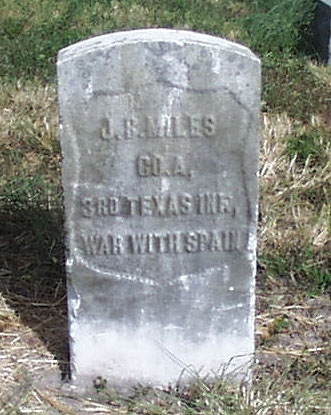J. B. Miles
J. B. Miles
Co. A
3rd Texas Inf.
War with Spain

Photo Credit: Rosa G. Gonzales
Military Record
The stone erected for J. B. Miles in Old Bayview Cemetery was one of those provided through the efforts of E. J. Kilmer who wanted to see that all the veterans of the United States armed forces were recognized in the local cemeteries. The stone indicates that J. B. Miles was a member of Co. A of the 3rd Texas Infantry in the War with Spain (1898). His military records record that “Joseph B. Miles� was only 19 years old when he enlisted to fight for his country. His records say that he was born in Harrison County, Texas (in east Texas) and that he was stationed at Camp Corpus Christi when he suddenly became sick and died of what appeared to be typhoid fever. The record notes that he was buried at the “city cemetery, Corpus Christi, Texas� and that what few possessions he had were sent to his father J. H. Miles of Longview, Texas (in Gregg County which is also in east Texas adjacent to Harrison County). The young man is described as 5 feet and 11 inches tall, of fair complexion, with blue eyes and light hair. By occupation he had been a farmer when he was enlisted by Captain Richard B. Levy at Longview, Texas on the 3rd day of May in 1898 to serve for two years as a private. Only two and a half months later young Miles was dead. The only mark noted on him for identification purposes was a scar on his right leg below the knee. He records note that he was already sick at the end of July and was admitted to the hospital with what was later diagnosed as typhoid fever. Complications developed as he then had pneumonia and peritonitis. A special report was sent by the local surgeon at the Camp Hospital in Corpus Christi to the Surgeon General of the U.S.A. In this report #2, 1st Lt. and Asst. Surgeon Sims stated that Private Joseph B. Miles of Co. A, 3d. Tex. U. S. V. Infantry, was admitted to the Hospital near Corpus Christi on July 31, 1898 and died at 5 a.m. on August 15, 1898 of typhoid fever complicated by double pneumonia and peritonitis, probably perforates about the 12th day. He says the onset and symptoms at first were atypical especially the temperature record. The diagnosis was cleared up by the end of the first week. The treatment was rationally consistent with the final diagnosis, and the patient received good treatment and attention. The doctor reports that young Joseph suffered a severe nervous shock at the time of the wounding of Private Bryan on August 8 (case #24). He had been entirely rational up to this time, but became suddenly delirious and never regained clearness of mind. The doctor reports the efforts made during the second week to isolate Private Miles so there would be no spread of the fever to others. He also notes in his report that the source of the infection remained undetermined. He says that typhoid fever is extremely rare in the locality of Corpus Christi and believes that because the disease developed so early after the young man’s arrival in Corpus Christi (on July 17) that probably Private Joseph B. Miles brought the infection with him probably from Camp Mabry or Fort Clark where the young man had been previous to arrival in Corpus Christi (Report of Aug. 31, 1898).
Research and transcription: Michael A. Howell